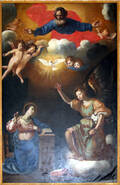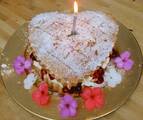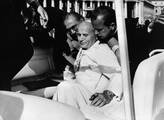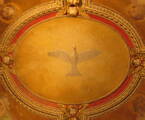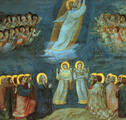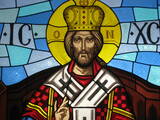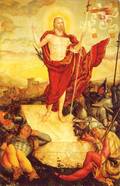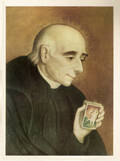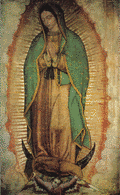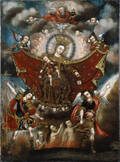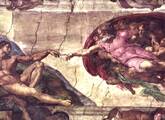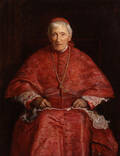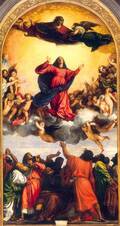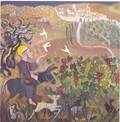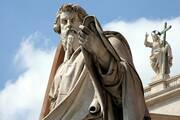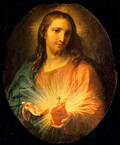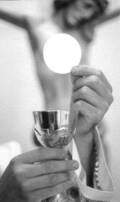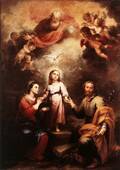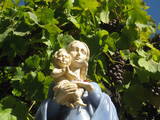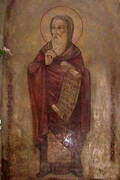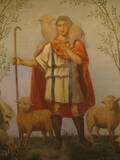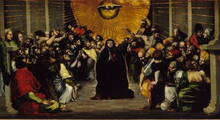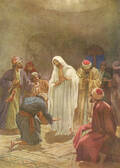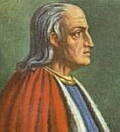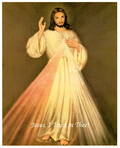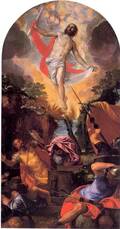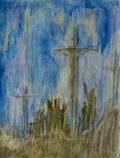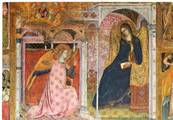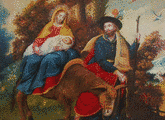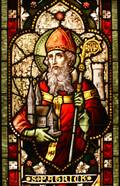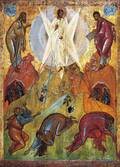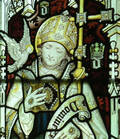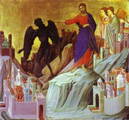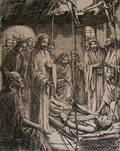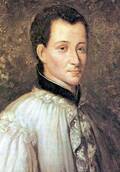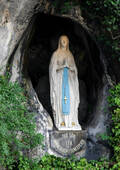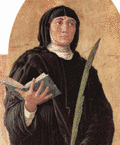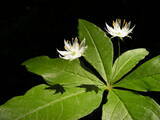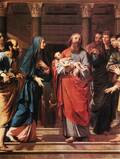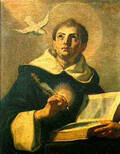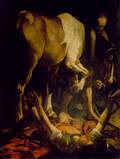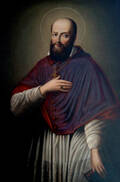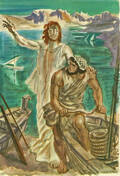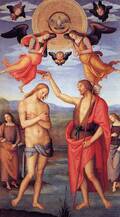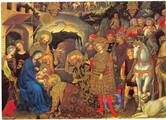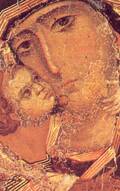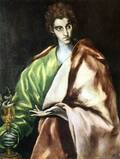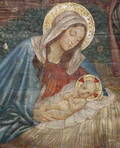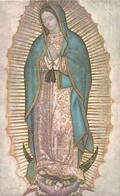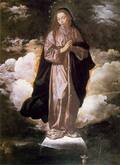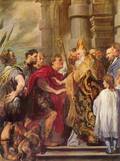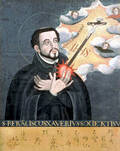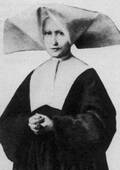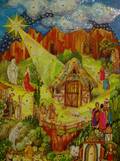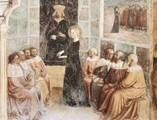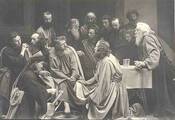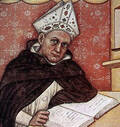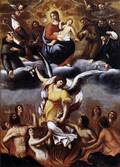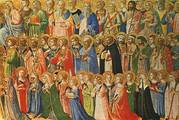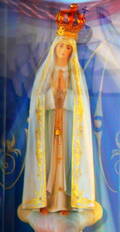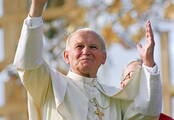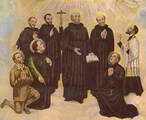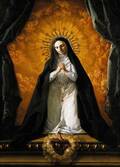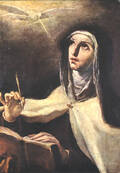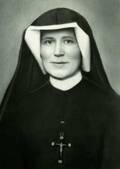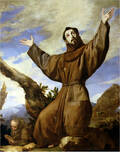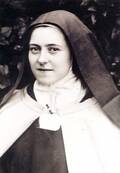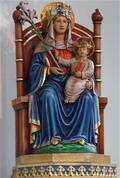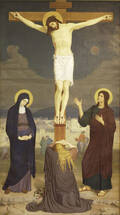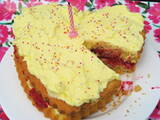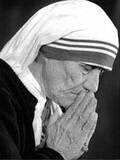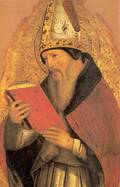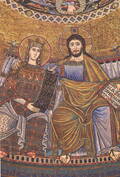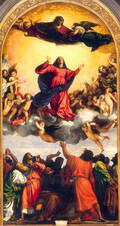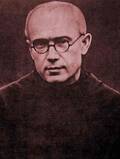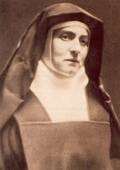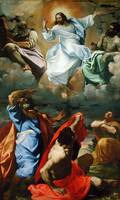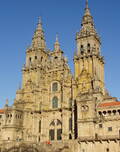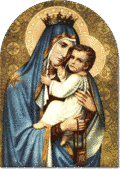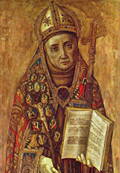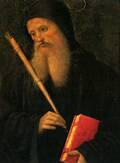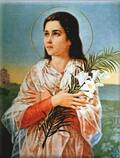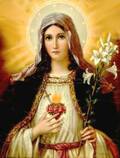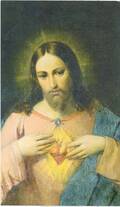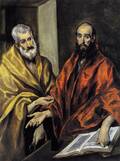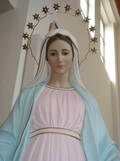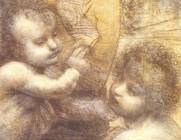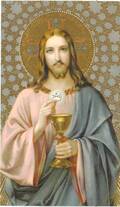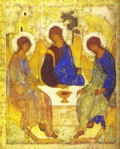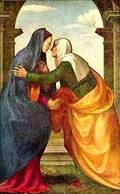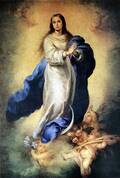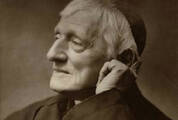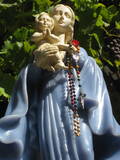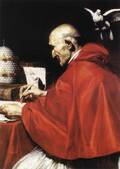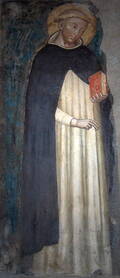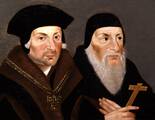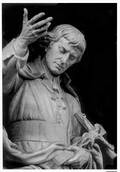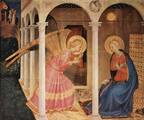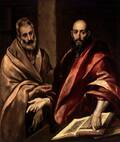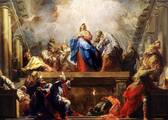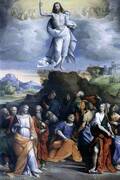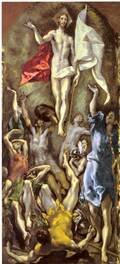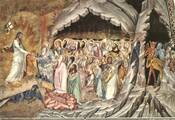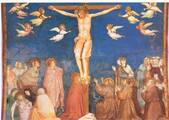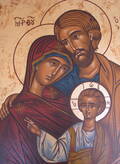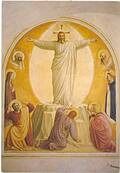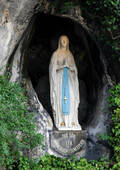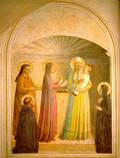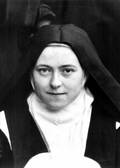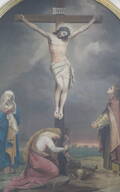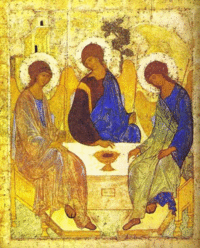
3 2us
Short reflections on Feast days and Saints days,
given to us by a fab collection of Catholic priests.
With many, many thanks to all the priests contributing. Also
many thanks to all the musicians who've contributed their music.
You can subscribe to this Totus2us podcast here on itunes or here on the RSS feed. To download the free mp3 audio recordings individually, right/double click on the blue play buttons.
Click on the titles below for more on the feasts/saints.
on the Annunciation of Our Lord
"By accepting the Annunciation and by saying 'Amen' as we say at the reception of every Communion, Our Lady said yes to stand with the Lord under the Cross, not only under the Cross on Golgotha but under the Cross of his life. When we say yes at the reception of Communion we echo her voice and we say yes to our cross, to the crosses of day to day life which we have to carry, the cross of anxiety, the cross of unsuccess, the cross of pain, many crosses big and small. But we say yes because we know we contribute to the plan of God which is the redemption of the world, the plan of God which embraces in love the whole world. Our sufferings, our yes to our sufferings, not only redeem us but they contribute to the redemption of the world. This is the big annunciation: we are called, as Our Lady, to be collaborators in the redemptive work of Our Lord Jesus Christ. Praised be to Him for ever and ever. Amen."
Solemnity - 25 March
on Our Lady's birthday
"The birthday is the coming into the world of something completely new. And in a very special way Our Lady’s coming into this world signalled something totally new and unexpected. Our Lady was a child as all other children. She had the privilege to be completely pure, she was completely innocent, she was completely without sin, even without original sin. But that meant that she was open to be able to be the gateway to something bigger, something unexpected."
Feast day - 8 September
on Pope Saint John Paul II
"One of my great heroes in the sainthood, Pope John Paul II, from a very young age had a marvellous impact on my spiritual life, on my love for the Church and on my passionate for the truth. He was such an astonishing human being and there are two attributes that I really want to bring to the fore. The first is very simple: his humanity. What an incredible human being, which I think is something we often neglect to examine, how important our humanity is. The second I say something about is his capacity to witness without fear."
Feast day - 22 October (date of his inauguration as Pope in 1978)
on Pentecost
"The Holy Spirit could be called God's music, speaking in us, singing through us in loving praise. .. The work of the Holy Spirit is also quiet and still, hidden deep down, as Comforter, very intimate, within each one of us through the quiet working of grace, in the Sacraments and in our prayer. In John's Gospel, the giving of the Spirit is described as the Risen Christ 'breathing on the Apostles.' That is something very basic to life, very quiet and still. You have to be quiet and still to be aware of your breathing. The Holy Spirit is the breath of life, bringing us eternal life, making us temples of God's presence, as St Paul says."
Feast day - 50 days after Easter Sunday, 8th Sunday of Easter eg 8 June 2014
on the Ascension of Our Lord
"The key note of the feast of Our Lord’s Ascension is hope, our hope of heaven. That was expressed in the opening prayer of this Mass: “For the ascension of Christ your Son is our exaltation and where the head has gone before in glory the body is called to follow in hope.' His presence and company day by day on earth, so that we may be in his company in heaven."
Feast day - 40 days after Easter Sunday, Thursday in week 6 of Eastertide eg 29 May 2014
(some boring countries have budged the celebration to the following Sunday eg 1 June 2014)
on Jesus Christ, King of the Universe
"Christ's kingdom is an eternal and universal kingdom, a kingdom of truth and life, a kingdom of holiness and grace, a kingdom of justice, love and peace. We must therefore be a people of truth, a people who protect life in all of its forms. We must be a people liberated from the seductive lures of this world and who live fully trusting in God's love and his gifts to us. We must be a people of justice, who love others without self-interest, and who work for peace. Let's be conscious that it is easy to say these lovely words but hard to truly live them! For we know that on our own it is impossible to live out these ideals. But with God, with Christ as our King, all things are possible. The Spirit of the Risen Lord is with us! With Him, we might one day reveal His kingdom here on earth as it is in heaven."
Feast day - Last Sunday of the Liturgical Year - 24th November 2013
on the Resurrection of Our Lord
"We are supported by love. That was the key I think to the beloved disciple’s faith in today’s Gospel. He looked into the empty tomb, when he had given way to Peter first. He saw and he believed. He believed because he loved and knew himself to be loved. May each one of us grow a bit more in our faith in the Risen Lord this Easter, in love and in being loved."
Easter Sunday - 31st March 2013
on Saint Vincent Pallotti
"Men and women, priests, religious, lay people, they all came together and had one only goal: to spread faith and enkindle charity, as Pallotti wrote quite often. And how? Well, they were the ways of new evangelisation. What he wanted was that among Catholics their faith would come alive again. And then a second goal he had, to spread the faith among people who had never heard of Christ. And the third point, works of charity. And when we ask what was his charism, what was his great idea behind it? I would say that he clearly saw that sanctity and apostolate belong together. You cannot be an apostle without really striving for sanctity and you cannot become a saint when you close your eyes to the needs of the others. You have to be an apostle in order to be a saint, you have to be a saint in order to become an apostle. And you can evangelise only what you love. That was the great message Pallotti had for us. And when we ask him, what is the foundation of your conviction? Why do you think it has to be this way? Well, he said, we are all created in God’s image and likeness, and God is love, is infinite love, and we should therefore be images of this infinite love of God, we should make His love visible, tangible, in the world of today."
Feast day - 22nd January.
on All Souls & Purgatory
"Although God’s justice requires that we set right our wrong doing by penance, we can help the souls in purgatory by our prayers, which appeal to the mercy of God. The greatest prayer, of course, is the Mass itself. This is also the most effective prayer for the dead, because the Mass is the sacrifice of Christ on the cross which takes away the sins of the world. Thus the faithful have Masses said for the dead. It is also a matter of charity to pray for the dead, whether for those who are dear to us in this world or for forgotten souls who have no-one to pray for them. Finally, I spoke above of those who ‘deserve’ heaven. Properly aware, none of us deserve heaven, as the saints were only too well aware. We only reach heaven by the mercy of God."
Commemoration - 2 November, though the whole of the month of November is dedicated in particular to prayer for the Holy Souls.
on Faith & the Year of Faith
by Father Francis Selman ![]()
Track - Credo by Ooberfuse
"As faith does not yet see clearly the things that are believed, in one way it is an imperfect virtue. Its virtue does not, like natural science or mathematics, lie in the clarity of its understanding but in the firmness with which it adheres to the truth, indeed to the First Truth. Faith also depends on trust because Christ is the Truth in person (cf Jn 14, 6). But faith is not just trusting in a person it is adherence to the truth, a truth which though not clearly seen is higher than anything natural science can tell us about in this world. This truth is about God, who is the Trinity, the divinity of his Son, and the mediation of his grace through the Church."
The Year of Faith, Annus Fidei, begins on 11 October 2012
on Blessed John Henry Newman
"Newman declared that he would not convert, that he couldn't convert, until someone walked barefoot from Rome to convert him. Elsewhere in Italy and because God has a sense of humour, another inspirational character, Bl Dominic Barberi, was praying for England with a truly missionary heart. He had received visions from Our Lady and told he must love this nation, which he came to do. And so, with barely a word of English, he approached the Vatican, asking permission to establish a Passionist order in this place. On a bleak October day, this rather shabby little monk arrived at Folkestone in what is probably comical attire. Having corresponded with Newman some years previously, he decided to make for Oxford and as he entered Newman's lodgings, soaked from the rain of a terrible storm and with his sandals removed, Newman realised with incredible awe that the Holy Spirit was at work. Here he was, Newman, and he was facing one who had come barefoot from Rome. Newman fell to his knees and there at the hands of Blessed Dominic he was received into the holy Catholic Church."
Feast Day - 9 October
on the Assumption of the Blessed Virgin Mary
"From the village girl of Nazareth to this wonderful Queen of Heaven, this is the story of the hidden glory of God and of the divine in all of his children, made real of course in this one perfect example held up to us. So this is a celebration not only of Mary, the one we love so dearly, but also of the whole of the Christian Church and, for that reason, very often the theology of the Blessed Virgin Mary will be linked directly to the theology of the Church, that is ecclesiology, our understanding of the Church, because what the Church says about Mary is what the Church proclaims about the work of redemption. This is beautifully summed up in the preface for the Mass for this feast: "Today the Virgin Mother of God was assumed into heaven as the beginning and image of your Church's coming to perfection and a sign of sure of hope and comfort to your pilgrim people."
Solemnity of the Assumption - 15 August
on 15th Sunday of the Year
'Take nothing for the journey' by Fr Emmanuel Mansford CFR ![]()
"Jesus knows the human heart and He knows our ancient and ever new temptation is to self-sufficiency, to seek to depend on myself, my own resources, a spirit contrary to that of the Gospel, of utter dependence on God. So when he sends out the Twelve, his closest friends, they are to take nothing with them for the journey, nothing, so that they can learn that their Father will provide. This truth is fundamental for anyone who wants to be a real disciple of Jesus. The beauty of material poverty is that through it we learn about our spiritual poverty, we come to know who we are and so experience the freedom of the children of God."

on 14th Sunday of the Year
on Truth by Father Michael Dunne ![]()
"Jesus because, as he says, his food and drink is to do the will of his Father in heaven, is not reluctant to adapt himself to the face of truth. Those less intent on doing God's will are also less intent on changing and especially changing themselves. And thus Jesus, the Truth, the Son of God and the son of Mary, a son as it were of Nazareth his home town, is not welcomed when he goes there to preach the Truth, preach the Good News of the Kingdom which calls for repentance and love, the turning away from apathy and self-love, to discipleship, the love of God and neighbour."
on Saint Paul
"When we consider how much of the world has received civilization from Europe and how much European civilization owes to Christianity, which transformed its Greco-Roman inheritance then, after Jesus, perhaps no-one has influenced history more than Saint Paul, who took the new Christian faith around the greater part of the Mediterranean. ... St Paul's whole life and work can be summed up in a single phrase: the desire to know Christ and to make him known. As St Thomas Aquinas comments on the Letters of St Paul, 'It is not enough just to be illumined but also to bring light to others.'"
Solemnity of the Apostles Saints Peter & Paul - 29th June
on 11th Sunday of the Year
on Patience by Father Anthony Nye SJ ![]()
"Last Friday was the Sacred Heart of Jesus: the Word of God loving us, guiding us, teaching us with a human heart, showing us humanity as it should be. Jesus is the supreme example of patience for us to follow. He said 'Learn of me for I am meek and humble of heart.' His whole life on earth was to seek the will of his Father, whatever the cost, wherever it led. 'My food', he said, 'is to do the will of Him whom sent me and to accomplish His work.' That meant much patient waiting on the will of God, his Father, as an example for our lives too. It was the silence and poverty of being born a baby, lying in the manger at Bethlehem, and then having to be taken as a refugee to Egypt to escape King Herod. There were 30 silent years, working as a carpenter in the out-of-the-way village of Nazareth, until the time that God his Father decreed he should appear in public. His way of teaching and gathering followers was not to dominate but invite, respecting human freedom with patience; respecting weakness as well as generosity in answer to his appeal. Think how patient he had to be with the growing opposition of the Pharisees and scribes, and how patient too with his disciples who were slow to understand his teaching, and especially slow and reluctant to accept that His way would be the way of the Cross and of suffering. There was so much silent and dignified patience in undergoing that suffering."
on Corpus Christi
"What is Communion? Communion is Jesus coming to you. Communion is Jesus entering into your heart. The heart is the inner part of the person, your heart is your intimacy, and communion is receiving the Body and Blood of Jesus Christ, but letting Him enter into communion with you: from heart to heart, the union of the heart of Jesus with your heart. We need Jesus. In the Old Testament, one of the words that is most repeated is 'heart'. Man has a heart and we could say that man is heart. We need the love of God in our hearts; our lives are empty without Him. Most of all, Communion is realising that God loves us so much that his love wants to fill our whole hearts. "
Feast Day - Thursday after Holy Trinity Sunday ie 7th June 2012 (tho some countries have transferred to following Sunday)
on the Most Holy Trinity
"The Father, the Son and the Holy Spirit are not only in one another but they are also in us: “In that day you will know that I am in my Father, and you in me, and I in you” (Jn 14, 20). This is especially true of the Eucharist when, through communion, Christ is in us and we in Christ. If Christ is in us, and the Father is in him, the Father is in us. As the Father and the Son are never without their love, who is the Holy Spirit, the Holy Spirit is also given to us with them as the Gift of their love. We remind ourselves of this mystery every time that we make the sign of the cross and say “Glory be to the Father, and to the Son and to the Holy Spirit”. The beginning of our life in Christ was at our baptism “in the name of the Father, and the Son, and of the Holy Spirit”. To live with Christ is to live with the Trinity."
Feast Day - Sunday after Pentecost .. so 3rd June 2012
on 5th Sunday of Easter
"'I am the branches' says the Lord, and you and I are the vines. We have to dwell in Him in order to find this divine energy, in order to ourselves become committed Christians and to share the commitment with one another. It's an extraordinary thing, we can't really love one another at all unless we are in union with God, because only God is love; the more we are united with Him, the more we are a loving people that can share with each other. It's not just words or talk, St John says in his first epistle, but something real and active. The commandments follow from this love of God. It's amazing to think St Catherine of Siena said that if we realised that God is love within us, we'd never commit a single sin."
on Saint Athanasius
"St Athanasius wrote 3 books against the Arians, in which he dealt with the passages in Scripture which they had used in order to prove that Christ was not indeed truly God. So his great contribution to the history of the Church is his affirmation and strong defence of the full divinity of Christ, a truth which we affirm regularly in the Creed: "God from God, light from light, very God from very God, begotten not made, consubstantial with the Father." This is thoroughly Athanasiun. We owe it a good deal to Athanasius, who was present at the Council of Nicaea in 325, the first ecumenical council at which this truth was confirmed."
Feast Day - 2 May
on Good Shepherd Sunday
"This Sunday is about a special call: vocation to the priesthood and the religious life, a special way of following the Good Shepherd. Of course there are other vocations too: the important one of marriage and many ways of serving in the Church as lay people. Those special vocations to the priesthood and religious life are supported and formed from the general vocation of lay people in the Church. We need each other. Pope Benedict's message for this day calls on that support: 'All vocations' he says, 'are a gift of God's love. In every age the source of the divine call is found in the initiative of the divine love of God, who reveals himself fully in Jesus Christ.' Vocation, call, does not come from us or our personal preferences but from God's love. The secret is to respond to that love, fully understanding and freely willing it."
Feast Day - 4th Sunday of Easter
on 4th Sunday of Easter, Vocation Sunday
"The Holy Spirit is a real light who shines on us and gives us surprising insight into the meaning of our lives and what we're capable of. And that's the second great gift of the Holy Spirit: He gives us power. ... We're created with a capacity for God, to love God, to know God, to be united with God and to share God to others; but on own we will fail to bring that capacity to its fulfilment. But if, through experiencing our own weakness, we turn to the Holy Spirit every day and say to Him: 'Give me your light; show me what I should do today. Give me your power.' These two gifts go together, because if the Holy Spirit gives us light and says to us 'You are capable of giving yourself 100% in love and that is the meaning of your life' .. if we don't have the power of the Holy Spirit to know that we can do that, then we will get depressed. So let's make that prayer every day, in union with Peter and the other apostles: Holy Spirit, give me light, open the Scriptures to me, open to me the meaning of my own life, give me the power to do what I cannot do by myself, which is to live every moment receiving your love, giving your love.'"
on 3rd Sunday of Easter
on Confession by Father Michael Krychiwsky ![]()
"The essential point is not the number and kind of our sins but the presence of true contrition, the willingness to change. Confession enables us to experience for ourselves what the Church sings in the exultet 'Oh happy fault! Oh necessary sin of Adam which gained for us so great a redeemer.' Jesus knows how to make all of our faults, once they've been repented, into happy faults, no longer remembered for the guilt or the shame that they engendered but for the experience of divine mercy which they occasioned. The way to experience profoundly the joy of Easter is through the door of the confessional."
on Saint Anselm of Canterbury
"This is something very important for St Anselm: faith in search of understanding. So it's not simply enough to affirm your creedal beliefs but you must try to understand them also. He is very strong and insistent upon: the importance of seeking understanding of what you believe. So in the work, the Proslogion, how and why God is both seen and not seen by those who seek him. So you have to raise up your mind and heart to God, which in some ways is a very good definition of prayer. In chapter 14 of the Proslogion he says, 'O my soul, have you found what you were looking for? I was seeking God and I've found that He is above all things and that than which nothing greater can be thought, I have found Him to be life and light, wisdom and goodness, eternal blessedness and the bliss of eternity, existing everywhere and at all times. ..'"
Feast Day - 21 April
on Divine Mercy Sunday
by Father Piotr Prusakiewicz CSMA ![]()
Track - Divine Mercy by Burke Ingraffia
"Mercy is the second name of love; it is love which gives itself, love in action. We celebrate the Feast of Divine Mercy, we worship the mercy of the Father who gave His only Son; the mercy of the Son Jesus who is Mercy Incarnate Himself, who gave His life for us; and the mercy of the Holy Spirit because God's love is poured out into our hearts by the Holy Spirit. This Sunday is called Divine Mercy Sunday and, according to the diary of St Faustina, this is the day when God pours out a whole ocean of graces on those who approach the fount of His Mercy."
Divine Mercy Sunday - 2nd Sunday of Easter (since the Jubilee Year 2000)
on the Resurrection
"The Holy Spirit guided John so that he could see beyond the visible, so that he could see the invisible. That is the mystery of Jesus, the Son of God, the Word of God. And the risen Jesus is in a way the Son of God fully expressed in his humanity and to reach the Son of God, the mystery of the Word of God made flesh, John needed the Holy Spirit. The Holy Spirit gave him this light, so that he could see, and helped him to believe. And that is for us. We need the Holy Spirit to make this act of faith in the risen Christ. To meet Jesus in our faith, we do have to call on the Holy Spirit - please, Holy Spirit, come. Come into my heart, pour your light and your love into my heart so that I am able to make an act of faith which is to discern the presence of Jesus, whereas I do not see him.'
on the Passion of Jesus Christ
by Father William Pearsall SJ ![]()
Music - Adoramus Te by David Bevan; sung by Holy Redeemer Choir
"Christ washes the feet of his disciples and on the day that follows he will wash the world in his own blood. So the bread which is broken is his own body which will be offered for us and the cup which he blesses and gives to his disciples is the cup of his blood which will be shed for us. And for this reason the Last Supper can never be separated from the Cross. They belong together. And the Cross itself is the reason Christ came - it is so that we can be reconciled with God through this gift of love whereby the Son of God offers himself on behalf of humanity and in his human nature is crucified to the wood of the cross, with his arms outstretched in an embrace nailed to that wood and an embrace that will include the whole universe and he bares the wounds of that suffering, even in his risen body. They remain the marks of that love in His glory in heaven so that God's own life is inseparable now from this moment of death, the death of Christ on the Cross and the Gospels speak of that as his hour of glory."
on the Annunciation
by Father Anthony Doe ![]()
Track - Blessed Mother by Zealous
"We must always remember that Our Lady is the Lord's first disciple. And what she did we are called to do as well. To find a way, through the grace of the Holy Spirit, of responding more and more in our own life with that prayer that she first uttered to the angel Gabriel. "Let it be done to me according to your word." It's the prayer that sums up the attitude of faith; it's the prayer that Our Lady wants to encourage us to pray every day, with great openness of heart, because it's the prayer that allows Jesus to come and make his home deep within us, incarnate his presence in us, and so enable us then to share with him that great prayer for the mercy of the Father on the world."
Feast Day - 25th March. As this falls on a Sunday in 2012, it's been moved to 26th March.
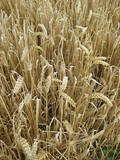
on the 5th Sunday of Lent (Year B)
"Today we begin Passiontide, we begin our final preparation to celebrate the paschal mystery, which is the crown of Christ's saving work, saving us because it saves us from our destructiveness, sets us free from destructiveness of sin which has the consequence of death. And in the paschal mystery, the great Easter mystery, Christ overcomes that power of destructiveness, that power of sin the consequence of which is death. Yes, it's hard to understand and yet our Lord in the Gospel gives us an image to help us, it's an image of a seed of the wheat grain and he says: 'I tell you most solemnly unless a wheat grain falls on the ground and dies it remains a single grain but if it dies it yields a rich harvest.' That image of the seed helps us understand the paschal mystery: the passion, death and resurrection of the Lord. It's God's way of showing us His power and His love for us. It's the way in which God makes Himself known above every other way."
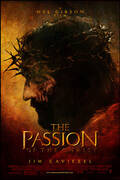
on the 4th Sunday of Lent (Year B)
"And finally, as Jesus falls under the weight of the cross, he catches the eye of his Blessed Mother, and Mel Gibson the director has him whisper to her, 'Behold, I make all things new.' It's a clever image. It shows us how Jesus is renewing all creation and renews the life of each one of us, through his faithfulness and love, calling us to do the same. So, yes, The Passion of the Christ is a violent film, and the Holy Week that approaches us soon is a dark time. But God loved the world so much that He sent His Son to be with us in this darkness, to carry it for our sake and to show that even there love is possible, the love of God. So the seed of eternal life that we've heard about in this Gospel today is planted in the soil of the Passion."
on Saint Joseph
by Father Anthony Doe ♦
"The Father chose Joseph because He saw in him a man who would be able to initiate His Divine Son into His own life; He saw in Joseph the depth and tenderness of heart, the compassion, the mercy, the wisdom and the openness to others that He wished to communicate to His Son Jesus in the flesh. So Joseph was the one who enabled Jesus to really freely embrace the Father in the depths of His spirit and come to know him, because Joseph was the human template that had cared for him as a child. So Joseph played an extremely important part in the life of Jesus. In those hours of silent prayer, in those encounters with the Father, something had already been implanted so that Jesus could genuinely know that the Father's presence was authentic and true, because he had already experienced it in Joseph."
Feast of St Joseph - 19 March. Feast of St Joseph the worker - 1 May.
on Saint Patrick
"When Patrck was alone on those hillsides, Slemish it was in County Armagh, he had noone to turn to for help but God. Patrick found God in his loneliness there. In fact Patrick needed those 6 years to mature, because at the end of the them he had become what we might call a holy man. He eventually escaped and found his way back to Wales. He became a priest and then a bishop. He writes in his Confessions: 'After I had come to Ireland, I daily used to feed cattle, and I prayed frequently during the day. The love of God and the fear of Him increased more and more, and faith became stronger and the spirit was stirred, so that in 1 day I said about 100 prayers and in the night nearly the same. So that I used even to remain in the woods and in the mountains; before daylight I used to rise to prayer through snow, frost and rain, and I felt no harm, nor was there any slothfulness in me as I now perceive because the spirit was then fervent within me.'"
Patron Saint of Ireland. Feast Day - 17 March.
on the Transfiguration of Our Lord
by Father Francis Selman ![]()
Gospel Reading for the 2nd Sunday of Lent
"At his transfiguration, Christ's face shone like the sun and his clothes were brighter than light. In his apostolic exhortation for the Jubilee Year 2000, Blessed John Paul encouraged us to behold and contemplate the face of Christ. The transfiguration especially calls us to direct our looks to the face of Christ. St Paul tells us that God who said light will shine out of darkness has shone into our hearts to enlighten us with the knowledge of the glory of God in the face of Jesus Christ.
on Saint David
"Another David, living 500 years after Christ, is the patron saint of Wales. He too wanted to put his whole heart into loving God. As a young priest he defended Catholic teaching, especially about how Christ alone saves us from the power of sin which is destructive of our humanity and how our humanity grows only with the help of God's grace. David lived a very ascetic life, he founded monasteries where a very simple life was promoted, a life stripped of as many material things as possible. It was not that he saw material things as bad, but simply that our attachment to material things, an over-dependence on them blinds us to the love of God. He became known as the waterman because his monks drank only water, a way of wanting to rely totally on God."
Feast Day - 1 March
on Lent
"Several of the saints, for example St Augustine and St Catherine of Siena, teach us that the first step to knowing God is to know ourselves. Lent is a time for being truly free and discovering ourselves in the presence of God. .. Lent is a time for reflecting more on the central mysteries of Christ's life and our life - it is by dying to ourselves that we come to new life in Christ."
Ash Wednesday - 22 February 2012
on 7th Sunday of Year (B)
on Confession by Father Emmanuel Mansford CFR ![]()
"He had hoped, maybe even half expected, to be healed because he'd heard about Jesus, he'd heard that he'd done this before, but not this. 'Your sins are forgiven.' My sins are forgiven? He must have thought. All of them? Gone, just like that? It was a scandal to everyone around. Never mind, they thought to themselves, if he heals him, but only God can forgive sins. But to prove that Jesus could forgive sins, he heals him and the man walks home, cleansed and healed, washed clean and set free, no longer paralysed physically or spiritually. The amazing scandal of God's mercy, so simple and straightforward, these words 'Your sins are forgiven', anticipating the power of the Cross, his blood shed for you and for me, washing our sins away when we come to him in repentance."
on Saint Claude de la Colombière
"Two major external events in his life, one was St Margaret Mary Alacoque. Now she was the mystic, suffering, most loving and devoted apostle of the Sacred Heart, to whom Our Lord gave the major revelations of the Sacred Heart. Claude it was who was for some time her director. A second major event was that for some years he was sent to England as the chaplain to the virtuous and delightful Mary of Modena, who was the wife of the Duke of York, who subsequently became James II, and he was there in the time of the Titus Oats plot against the Catholics, and was imprisoned for a while before being banished."
Feast Day - 15 February
on Our Lady of Lourdes
"Sickness and suffering are a big puzzle to human beings. We're all created for health - health is the normal state of man. But sickness and suffering are a reality of our life, nobody can avoid it completely, it will hit everybody at a certain moment in their life. Since we believe that for God there is no trash, everything he has permitted he can use for a good end, the secret of suffering and of sickness reveals a big mystery, a mystery of God's greatness. I believe this was the reason of Our Lady's appearing on 11th February 1858 to Bernadette Soubirous. But she didn't appear to explain suffering, she appears silently, she doesn't say anything the first three apparitions, and she just holds a rosary in her hand and Bernadette prays the rosary. The beginning of that revealing, of the understanding of the mystery of suffering is prayer. If we ask Our Lord, if we enter, if we approach Him in prayer, He can reveal to us the mystery of suffering."
Feast Day - 11 February - World Day of the Sick
on St Scholastica
"The Benedictine Order, whose daily life is based on prayer, has been a great civilizing influence in Europe quietly throughout the centuries. For when civilization receded with the end of the Roman Empire, as Europe was overrun by Barbarians, learning and art continued in the monasteries until the high Middle Ages. Here is a lesson for us today. Much of what we value in European civilization, which for the most part until very recent decades has been Christian, was built on prayer. May the beauty and freshness of St Scholastica's hidden life of prayer inspire us to seek God in simplicity of heart from day to day in our own time."
Feast Day - 10 February
on the 5th Sunday of the Year (B)
on Time by Father Marcus Holden ![]()
"We are talking about ultimate human fulfilment: we've been offered something so sublime, so majestic, so great: the eternal love of God. If this isn't worth giving our time to, what is? St Bernardine of Siena used to say: 'Time is worth what God is worth. For with each moment of time we may purchase God and buy eternal glory.' In the world around us, people forget that time is precious ... In reality, every moment, every thought, every word and every action will have infinite repercussions in eternity, for good or for ill. And what then will shine out from our lives? I assure you it will be our prayers and our Masses, our confessions and our spiritual reading, our acts of charity and our evangelisation. To say this stuff is like gold dust is to underestimate it."
on the Presentation of Jesus in the Temple
"We too are presented to God. Please God each one of us is alive in the life of Christ, what we Catholics call 'in a state of grace', and presented in some way also through the hands of his mother. It was through her, after all, through her yes, that God became man. So we are endlessly in the situation of being held before God in his holy place by Mary and we must pray that the Christ life in us should grow and develop."
Feast Day - 2 February
on Saint Thomas Aquinas
"Love for Christ pushed Thomas Aquinas to devote a tremendous amount of energy to the search for truth, to contemplating the truth and to teaching the truth. He consecrated his intellectual gifts to God and so he's a great model for us of the sanctified mind. His aim was to let himself be taught by God and so he was humble enough to be formed at the school of the pagan philosopher, Aristotle, because he understood that everything that's true, whoever may say it, is from the Holy Spirit."
Feast Day - 28 January
on the Conversion of Saint Paul
"Now what is important about his conversion? Well this, that he is so vital for the Church. It's very mysterious, Our Lord had chosen 12 apostles to whom he gave authority to teach all nations and guaranteed that they would teach the truth. We look on them as the first bishops; 1 of them was Judas, he had to be replaced, but these people had all known Our Lord in his earthly life. He chose out twelve, St Mark says, to be with him. But St Paul was not with him. St Paul, a learned man, learned in Jewish religion, highly intelligent .. persecuted the Church and did it zealously for a long time. Now it was this man who met Jesus in a different way. He was on his way to Damascus to persecute Christians and Jesus appeared to him, he knocked him off his horse, turned him blind, and a voice from heaven... Now that was the man whom Jesus chose. God can do anything and he chose him, as St Paul says, as it were out of due time. He really did meet Jesus but it was in a different way and he realised that God was calling him to preach, to be the apostle, to the non-Jews, the Gentiles."
Feast Day - 25 January
on St Francis de Sales
"He was not only a bishop but he is also a Doctor of the Church, especially for his particularly consoling teaching about prayer, which again especially reflects his spirit of gentleness, as he teaches us not to be troubled by past sins but to have confidence in God and to make our misery into a throne for God's mercy."
Patron Saint of Journalists. Feast Day - 24 January
on the 3rd Sunday of Year (B)
"There is a truth, I believe, in saying that the secret of Peter, Andrew, James and John was that they trusted the one who called them. It wasn't that they believed that they had all the answers themselves; no, because later in their following of Jesus, they would make mistakes, Peter would betray Him, and yet what carried them through to the end was that ability to trust. If we are to make commitment, if we are not to be mere historians of what might have been in our own lives, there does come a point when we hear the invitation 'Follow me' and we dare to trust the One who issues the invitation. In the words of good Pope John Paul II, 'Let us arise. Let us move forward in hope.'"
on the Baptism of Our Lord
by Father Augustine Conner CFR ![]()
"In Jesus Christ, true man and true God, we discover who we are and why we exist. We discover that we were made through him and for him. We discover that we are made in his image and likeness. That we are his brothers and sisters and beloved sons and daughters of the Father filled with his Holy Spirit and destined to share his glorious resurrection. We discover that each of us is eternally loved and chosen and shares in the very dignity of God."
Feast Day - Sunday after the Epiphany. 1st Luminous Mystery of the Rosary.
on the Epiphany
"The best gift that we can give is the gift of ourselves. The best gift is not a material thing but it is our heart and It is what we truly celebrate in the Feast of the Epiphany: God has given himself to us, God has given our heart to us in the Incarnate Word, the baby Jesus, which is given to humanity. The invisible God has made himself visible in the flesh of Christ."
Feast Day - 6 January - 12th Day of Christmas (in some countries, this feast is transferred to Sunday :o(
on Mary, Mother of God
"The World Day of Peace is about God who works together with us to change the state of the fallen world into the state of the redeemed world of paradise. Mother Teresa in her 80s was asked by a journalist "What have you changed in the world?" She answered "I never wanted to change the world. I only wanted to be a drop of fresh water in which God's love could be reflected into the world." .. I hope that we will be the same - to be little drops of clean water through which the love of God can, unhindered, be let through into the world. And that love of God is done by faith, by prayer, by fasting and by almsgiving. In this way our love for God and for our brothers and sisters will grow, and through that the light of God will start shining into the world. Here in Medjugorje this is precisely the message of Our Lady: faith, to change our way, to believe in God, to fast, to pray and to give alms. This is the classical teaching of the Church throughout all the centuries. Our Lady does not change - she is the same, with her complete dedication, her complete obedience to God: "Be it done unto me according to Thy Word.""
Feast Day - 1st January - also the World Day of Peace
on St John the Apostle and Evangelist
"Saint John was the youngest of the Apostles, 'the beloved disciple', the one whom Jesus loved and the only one of the 12 who remained with his Master all the way to the foot of the Cross. He was the last to write a Gospel and the last of the apostles to die as an old man, still the Bishop of Ephesus, around the year 100. With the wiritings of the last of the apostles, revelation came to a close. We keep his feast day just two days after the birth of our Saviour, when we think of the great mystery of the Incarnation, for St John was especially the Evangelist of the Incarnation. He wrote the phrase 'And the Word was made flesh', perhaps the most important sentence ever to have been written in history. I like to think that the reason why St John had a special insight into the mystery of the Incarnation was because he was the disciple to whom Jesus entrusted his mother at the foot of the Cross, "Behold your mother." Thus teaching us all to look to Mary as our mother and the mother of the Church."
Feast Day - 27 December
on Christmas
"Christmas tells me so much about myself, about being a human being. It tells us that God wants to share his life with us completely. The fact that God became flesh and dwelt among us tells us that God identifies with us in every way except sin. This is an important message for us to take to heart because it tells me that I am infinitely loveable to God."
Christmas Day - 25 December
on Our Lady of Guadalupe
Patroness of the New Evangelization, Patroness of the Unborn & Patroness of the Americas
by Father Emmanuel Mansford CFR ![]()
"Over the years millions, literally millions, of Mexican Indians were converted because the image is such that Our Lady of Guadalupe is clothed with the stars (on her cloak are the stars), behind her is the sun and she is standing on the moon, and so the Indians, who worshiped these pagan gods of the sun, the moon and the stars, knew that she was more powerful than them because she stood on the moon, she was in front of the sun and she was clothed in the stars. But they also knew that she wasn't God because her head was bowed and her hands were joined in prayer, and they saw that round her waist was this sash that meant that she was pregnant and right over her womb was this flower in the shape of a star which was a sign to them of the one true God. So they came to believe that this true God she was in fact pregnant with. Over the years around 9 million Mexican Indians became Catholics. All this happened in 1531 and following years. So while the Reformation in Europe was happening and hundreds of thousands were leaving the Catholic Church, in Central America millions were becoming Catholic due to the advocacy and love for the poor of Our Lady."
Feast Day - 12 December
on the Immaculate Conception of Mary
"It took a long time for the Church to work out how the Immaculate Conception could have happened. (After all, Our Lady was redeemed like all of us, but how could Jesus have redeemed her before as man he existed?) Heaven took a hand in nudging the Church towards the right conclusion, especially when it was given the “Miraculous Medal” in 1831 (“Oh Mary, conceived without sin, pray for us who have recourse to thee.”) At last in 1854 the Church was clear enough in its mind to define the doctrine, and to say that rightly understood you could work it out from Scripture. And then heaven intervened again. At Lourdes in 1858 Our Lady said “I AM the Immaculate Conception.” To the credit, one must say, of the Jesuits – who, with the Franciscans – always backed the doctrine, this church was called by that title even before the definition.
Let’s honour Our Lady, and praise her beauty, and thank God that we welcome the doctrine of the Immaculate Conception, and its consequence, the Redemption, and accept the fact of original sin; and are grateful that the Church which teaches us the truth with Christ’s authority clarifies what is obscure in Scripture."
Feast Day - 8 December
on Saint Ambrose of Milan
by Father Emmanuel Mansford CFR ![]()
"This man, this bishop, this shepherd, clearly in his life was reproduced the life of Christ. I think in our times when there's increasingly greater confrontation between the Church and the secular authorities of civil society, that we need the courage of St Ambrose and we need shepherds who have his gift of prayer and humility and fortitude to stand firm. And if we look at how God chose him, it's a reminder to all of us that we never know what God has in store for us, but once we submit to His plan, simply to put ourselves into the hands of God, and to allow His grace but also the gifts that He has given us to be used for his glory. So, Saint Ambrose, pray for us."
Feast Day - 7 December
on Saint Francis Xavier
"St Francis Xavier is one of the patrons of the missions .. when he turned to Jesus, he was ambitious for Jesus. The thing is he was totally unselfish which is the vital thing. Unselfishness is really almost what we mean by charity, by love: not having self first. Incredible journeys in those 10 years in the East, massive responsibility, India, Malaysia, islands of the East Indies, Japan, very nearly China; greatest hardship and through it all immense prayer life, immense charity, immense love."
Patron Saint of Missionaries. Feast Day - 3 December
on Saint Catherine Labouré
"St Catherine Labouré was a woman to whom Mary revealed the desire of God to give grace. In a special way therefore in celebrating this feast day, we need to celebrate this saint who allowed herself to receive that message: the humility of her heart to enable herself to be so loved by God that she could even receive Mary as a mother, mediatrix (which means channel) of His gift of Himself to her; to allow oneself to be loved in a way that we can't even understand. For example to think about those graces for which we haven't even asked - what must those graces be like? That's what Our Lady told St Catherine: God wants to give even more than what you ask for. It's like plunging St Catherine on a spiritual path of desire, saying 'Do you really want to cooperate with God?' then desire for the rest of your life."
Feast Day - 27 November
on Advent
"Advent is the time when we pray that the Holy Spirit will move deeply and mysteriously in the hearts of all of us; will prepare that place where Jesus can be born deep within our own lives, our own spirits, our own hearts, as he was born in the life of his mother Mary."
This year, Advent begins on Sunday, 27 November.
on Saint Catherine of Alexandria
"When the Emperor Maxentius began persecuting Christians in the early 4th century, in the final gasp of pagan fury, before Constantine through his defeat of Maxentius at the Milvian bridge in 312 brought peace to the Church, Catherine rebuked him and, with the clear-sighted wisdom of her young mind, she showed that his pagan gods were empty idols. As Maxentius could not reply to her arguments, he called a large group of philosophers to a dispute with St Catherine, who was only 18 years of age but well able to handle her case single-handed against the most learned men of Alexandria. On the way she converted the Emperor's wife, which further infuriated him. He gave orders for a spiked wheel to tear her flesh, a so-called 'Catherine wheel', but the bonds that held her down broke, so she was beheaded instead."
Patron Saint of Philosophers & Students. Feast Day - 25 November
on Christ the King
by Father Martin Sabathé CSJ ♦
"Jesus is King in serving us for our good and the good of all His Church… Jesus is King by washing the feet of his disciples, in this very humble service by which he says to his disciples "Do you accept that I wash your feet."
Feast Day - last Sunday of the Liturgical Year - 20 November 2011
on St Albert the Great
"The relevance of St Albert for our own time can hardly be over-estimated. Surely the Patron of Scientists deserves to be better known today than he is and to be properly honoured. For the main attack on Christianity today comes from materialists who are much influenced by the scientific outlook. We need to pray to St Albert the Great, so that the study of natural science does not lead people away from God but can open their eyes and minds to Him, for they are studying the wonders of His creation. St Albert also reminds us that a knowledge of natural science needs to be a part of Christian learning today if we are to be able to hold a dialogue with non-believing scientists. For this purpose the Pope now has a Pontifical Institute of the Sciences. In our time we especially need to know how to apply our scientific knowledge and to use the invetions of technology with wisdom: this is, in a way that is truly beneficial for our way of life and is not destructive of human life nor diminishes a fully human life but respects God's design of nature. As St Albert wrote: 'There is in us an imprint as though a stamp of the divine wisdom .. Because of this more is acquired by prayer and devotion than by study.'"
Patron Saint of Scientists. Feast Day - 15 November
on All Saints
"The Church celebrates all saints - all the saints of all the centuries.. all those who have gone to heaven through the grace of God. Sanctity, Mother Teresa once said, is not the privilege of the few, sanctity is the simple duty for you and me, we have all been created for that. That is her view and she echoes very well what the Second Vatican Council tells us: the common call to sanctity. .. Of course none of us can live the virtues but we all can open up to the guidance, to the strengthening, to the counselling of the Holy Spirit. We all can open up to start on a way of sanctity, because sanctity is not the point which we have reached and from them on we can see halos on our heads or are lifted 1 yard up above the others, but sanctity is the path and it is the narrow path into the kingdom of God. It is a path which Jesus says is comparable to the eye of a needle - it cannot be found by ourselves. It is very difficult for ourselves to enter the kingdom of heaven but what for us is impossible, for God is possible. So sanctity has a lot to do with us being linked closely to God. And how do we get linked to God? By the means by which the Holy Spirit guides us and the Church teaches us; it is very simple. It is by getting into silence first, into the silence of our hearts. God speaks in the silence of our hearts .. The first step for getting in touch with God would be to kneel down or sit in a Church and say 'Lord, what do you want me to do?' and He will clearly answer 'I want you to be a saint' .. Our vocation is to walk, to walk a path of holiness under the guidance of the Holy Spirit in His Church."
Feast Day - 1st November
on Our Lady of Fatima
by Monsignor Leo Maasburg ![]()
Ave Maria sung by Anna Johnstone
"The angel asked the children in Fatima if they were ready to go out and they say yes, we are ready to face the sufferings of this world which nobody can avoid. On 13th May 1981 another great person had to suffer and that was Blessed John Paul II. And I happened to be at St Peter's Square when, in the evening, hundreds and thousands of people gathered just to pray. There were candles on the ground where he had been shot and he was in hospital. We were praying the rosary there. Suddenly you could hear a strong clicking noise and the loud speakers were switched on in St Peter's Square. And after a long time, maybe 10 minutes, you could hear a very heavy breathing, very slowly, and already the word spread that this was a broadcast from the room of the Holy Father in hospital. And then a very, very slow, a real suffering voice came across "Totus tuus ego sum." A long silence; it took him I guess at least 3 minutes to pronounce these words. And then he said "I have forgiven the man who made an attempt on my life." I believe this is exactly what the message of Fatima wants to tell us: are we ready to offer our lives, are we ready to offer our sufferings, in order to be able to forgive?"
Feast Day - 13 May - 31st anniversary of the assassination attempt on Blessed John Paul II
on Blessed John Paul II
"John Paul II was a very courageous man, not only during the Nazi occupation when he was studying for the priesthood himself secretly and was ordained priest. But also later on in his life he never shrank back from things which his heart told him to do. A few weeks after his election to the See of St Peter, I had a friend with advanced cancer and she asked me if it would be possible to meet the Pope ... After Mass, he came out and greeted us and said to her: "Il tuo sorriso mi indica la presenza di Dio in te' - 'Your smile indicates to me the presence of God in your heart.' .. When I had the occasion to meet him together with Mother Teresa of Calcutta, the way they met, how they communicated with each other, it was such a joy, but the atmosphere was so normal, although there was a big, big tenderness in their relationship. And I noticed that, when they had finished talking about their business, hardly anything was said, they didn't speak anymore. The Pope normally accompanied Mother Teresa to the door, but they didn't speak, they just walked and sometimes the Pope put his arm round Mother Teresa. So I thought real love doesn't need any words and maybe even forbids small talk, and they were two such big personalities they didn't need to cover something through their talking but they could let love shine through them just by a simple gesture."
Feast day - 22 October (this recording made on 2nd April 2011, the anniversary of JPII's death)
on the North American Martyrs (Saint Noël Chabanel)
"There wasn't a slacker or a coward among them. These men were on fire with the love of God and of Jesus crucified and love of the indigenous people they came to serve. Men of total generosity, faithful to God, gifted in prayer, unsparing in their unselfishness, courageous, tough, spiritual giants .. But physically how did this weak man, Noel Chabanel, stand up to martyrdom - superbly; he died, like the others, without a murmur. You see he was hit on the head with a tomahawk by a renegade Huron while they were going through the forest and he never knew a thing, he just woke up in heaven. He wasn't a wimp but I like to think he is the patron of those of us who are."
Feast Day - 19 October
on Saint Margaret Mary Alacoque
"It's 1673 in France. A nun aged 26 has been 2 years in the convent, she's pale, she's thin, she's ill, big eyes, nervous, it's dark, she's praying. What's she doing? She's talking to Jesus who will reveal to her in 4 visions over the next 2 years the mystery of His Sacred Heart. This woman, St Margaret Mary Alacoque, is terribly important, massively important. What she sees and hears will alter nearly every Catholic church to be built and the devotional life of every good Catholic. It will restore the Church after the blight of Jansenism, it will give rise to religious orders and devotional practices. Until the devotion to the Divine Mercy in the late 20th century, it will do more than anything else to assure us that God loves us - loves us humanly as well as divinely, that God thinks we're worth dying for."
Feast Day - 16 October
on St Maria Faustina Kowalska
"It's a message that although we have so much to distrust in ourselves, we can have an absolute complete confidence in God's mercy towards us. St Faustina was not only the 'secretary', the mouthpiece of this message, but she lived it herself in the convent, through many ups and downs, as did Saint Thérèse. She had to learn to trust the message of mercy, she had to learn to detach herself, as we all do, from doing what she wanted, she had to experience many, many trials, disbelief, people thinking that she was deluded. Even after her death for many years the message of Divine Mercy was suspect. .. Eventually, thanks to the very providential appointment of John Paul II as Pope, these messages became known and accepted, and with them obviously it was only right to honour St Faustina, the very unknown, humble saint."
Feast Day - 5 October
on Saint Francis of Assisi
by Father Emmanuel Mansford CFR ![]()
"St Francis had everything - from a very wealthy family, properous father, very popular young man, bit of a party boy, went off to be a knight when he was about 20 (which was sort of the equivalent of being the winner of the X-Factor), very respected and loved by his friends, the one who was at the centre of the life in Assisi - and yet when Jesus came into his life, it was like a revolution for him and he simply responded whole-heartedly. Just as he had given himself totally to partying, totally to fighting in the war, suddenly when Christ comes into his life he's changed and the encouraging thing for all of us is that it wasn't just overnight. Sometimes we think with the saints they're bad and then they become good but for Francis it was probably over a period of 5 years where Jesus is taking more and more of his heart captive."
Feast Day - 4 October
on St Thérèse of the Child Jesus and the Holy Face
"St Thérèse of Lisieux embodies an extremely important truth that Jesus clearly enunciated to his disciples many times. Thérèse, with that transparency of faith, that openness of heart, that childlike trust in the power, the mercy and love of the Lord, embodies for us this message so profound of Jesus: unless we become like little children, we cannot enter the kingdom of heaven. To become a little child, not to become childish but childlike: open, receptive, willing to receive what God wishes to give us, just as a child so desires the gifts that the parents wish to give, the gifts of their love, of their strength. And Thérèse above all embodies that spirit of openness, childlike willingness to receive from God. And in her teachings she very clearly enunciated a pattern of life, what she called her 'Little Way', a way of surrender to the person of Jesus in the minutest details of daily life, but particularly when she and we are confronted by our weakness, our failure, our human frailty, our vulnerability, all those things that we cannot change in ourselves. Thérèse had that wonderful insight to see that these were moments not to deplore but in fact to rejoice in because they were opportunities to give herself, give ourselves, to the person of Jesus and to recognise that it's His power, His strength, His love, His wisdom that in the end is meant to empower us. And she encourages us constantly to see our daily life in terms of moving more deeply into this bond of love with the person of Jesus who can only give himself to us when we are open and receptive to His gifts like children."
Feast Day - 1 October
on Our Lady of Walsingham
"Today's the feast of Our Lady of Walsingham, calling us to prayer for Christian unity. Why this connection between Mary's appearance in Britain and Christian unity? Because Our Lady's appearance was not accidental but a moment of grace and the start of a chain of events connected to England's conversion which involves, I believe, the implementation of the ordinariate in our day. To better understand, let us travel back together to the day it all started. The year is 1061 and, under a Catholic banner, England is known as Our Lady's dowry and its flourishing like never before. This was a great golden era, a time of renewal: cathedrals are built, churches are erected and they're going to define the landscape for so many different generations. Catholic devotion suits the English people and it leads to a great cultural flowering, producing in my opinion the greatest art, music and architecture that this land has ever seen. And in a tiny Norfolk village we find a noblewoman, Richeldis de Faverches, deep in prayer. To her amazement, the Blessed Virgin appears to her in a vision 3 times, instructing Richeldis to build a replica of the Holy House of Nazareth. Richeldis undertakes this work with obedience and soon a spring of living water is unearthed. Once built, the priory shrine of Our Lady of Walsingham became the beating heart of Catholic England. From all over Europe people flocked, to be healed, to pray, to receive the sacraments, to give devotion to the Lord. Peasants and kings were equal here, in this place of profound grace, miracle and favour."
Feast Day - 24 September
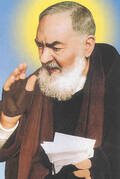
on Saint Padre Pio of Pietrelcina
by Father Emmanuel Mansford CFR ![]()
"He was truly a priest. As Pope John Paul said, 'A man for others'.. He was a man truly configured to Christ."
Feast Day - 23 September
on the Exultation of the Cross
"Jesus redeemed us because he accepted all that suffering without hating us. Because the normal human reaction if we are hurt, if we're offended, if we suffer, is at least resentment, if not hatred. And Christ did not hate us for a single second (had he hated us for a single second we would not be here). So in that moment on the Cross, instead of reacting humanly, he reacted divinely. He said 'Father, forgive them, they do not know what they are doing.' And maybe the young people of our day have understood that there is suffering in the world - there is no life without suffering, we cannot avoid, we cannot flee suffering; so suffering is part of our human condition. But the answer, our reaction to suffering, is a revelation either of our human state or of our divine state. And I believe that this celebration of the Exultation of the Cross is for us a question mark: where are you standing? How are you reacting to suffering? Are you so close to Christ that you say "His example, his suffering on the Cross will give me the strength to at least attempt not to hit back, not to hate, not to have resentments, but to say 'Father help me to the will of forgiveness and please forgive.'""
Feast Day - 14 September
on Our Lady's Birthday
"Our Lady's birthday reminds us that each one of us has been born to love and be loved. That is the reason of our being."
Happy Birthday, Mama Mary!
Feast Day - 8 September
on Blessed Mother Teresa
by Monsignor Leo Maasburg ![]()
with 2 quotes by Mother Teresa of Calcutta
Mother Teresa - “The young people, especially in their application, write: ‘I want a life of poverty, prayer and sacrifice that will lead me to a service of the poor."
"The lonely, the unwanted, the unloved – we try to bring Jesus to them, by involving them in the service of the poor, by our presence among them, they must be able to look up and see Jesus in us. And also I believe in helping them to come in touch with the poor, because the poor give us much more than we give to the poor.”
Fr Leo: "John Paul II said ‘In Mother Teresa we meet one of the most important personalities in history’ .. Hers is the sanctity which shows the whole mystery of the redemption, sin and redemption. And I believe that we can pray to and venerate Mother Teresa precisely for this, to help us to collaborate in the redemption of the world. On her feast day this is the biggest wish I want to express. When we celebrate the memory of her death on 5th September, we can even liturgically invoke that favour from her: to be able to collaborate for the redemption of the world."
Feast Day - 5 September. This was recorded on 26 August 2010, the centenary of Mother Teresa's birth.
- Flash is required!
Blessed Mother Teresa: "Sanctity is not the luxury of the few.
It is a simple duty, for you and for me."
on Saint Augustine of Hippo
"One of the most vital and important elements of St Augustine's spiritual vision is his stress on the importance of the heart; he is not simply a mental thinker or a mental prayer. He believes the heart is important and he has famous sentence in the opening of The Confessions when he says 'Thou has created O Lord for Thyself and our hearts are restless until they rest in Thee.' The word heart occurs on many, many occasions. The inner truest self .. the heart directing itself always inwards and upwards, upwards and outwards to God.'
Feast Day - 28 August
on the Coronation of Our Lady
"This is really the meaning of Our Lady as Queen of Heaven: Queen of Mercy, Queen of the compassionate outreach of the Father's love in her Son. And so she stands as the greatest gift to the human race. She is one of us, somebody who is now living her humanity to the full, and who is living it for us, for our salvation, and is there always with that power and authority that comes from God, to take every single human being by the hand and lead them into His merciful presence. So we really do thank the Father for this greatest of gifts, this wonderful friend, this wonderful mother, this wonderful person, who embodies the fullness of God's merciful compassion for the human race. We turn to her and ask her always to be with us, especially in moments of greatest need. Mary, Queen of Peace, pray for us.'
Feast Day - 22 August
on the Assumption of Mary
by Father Iain Matthew OCD ![]()
Ave Maria sung by Anna Johnstone
"Mary's assumption into heaven, as well as speaking of her littleness, also speaks of humanity's greatness. St John of the Cross has a phrase that God rejects nothing that is human, nor excludes anything human from this love: to love the Lord your God with all your heart and all your soul and all your mind. Everything human, soul and body, is fit for the glory of God. And Mary's assumption, soul and body, is a declaration that we - spirit, mind, heart, and body, this body that is so easily idolised or mistreated or kicked around in our world, is meant for glory, is sacred, is good. To be assumed into heaven means to be taken into the fullness of love. It doesn't mean to be taken away, it means be taken into the fullness of love, into the life of the Blessed Trinity. So the whole of Mary is taken into God's love, which means that she is completely here with me, with you. Assumed into heaven means more in God, so more with you, able to embrace you, to take you into her heart, to carry you in her heart.'
Feast Day - 15 August
on Saint Maximilian Maria Kolbe
by Father Emmanuel Mansford CFR ![]()
"The words of Jesus, quoted by Pope John Paul II at his canonisation, are what come to mind "Greater love has no man than to lay down his life for his friends." St Maximilian, aided by the prayers and his love for Our Lady, gave himself completely, totally, as she did, up to the point of the Cross, so that another man may live, may go home and look after his wife and his family. This man, this priest, St Maximilian Kolbe, was called by Pope John Paul II 'the Patron Saint of our difficult century'. Where so much innocent life was taken through communism and naziism, he stood for the Gospel, for the gospel of life, as a witness. In our age, we, especially men, should be challenged by his life of commitment, of sacrifice, of saying yes to God totally, of being a man for others.'
Feast Day - 14 August
on Saint Teresa Benedicta of the Cross (Edith Stein)
"Although Edtih Stein became intellectually convinced of the truth of the Catholic faith, what moved her to become a Catholic was the example of the serenity of a friend in accepting the death of her young husband. One night when she was guarding the house for some friends, she found a copy of St Teresa of Avila's 'Life of Herself' on the bookshelves. She took it down and read it right through that night. In it St Teresa of Avila talks about 'the Truth that underlies all truth'. Edith wanted to possess what St Teresa of Avila had. Thus Edith Stein's conversion to Catholicism was a the same time her vocation to be a Carmelite. She was baptised in 1922, aged 31, but it wasn't until 1933 that she entered the Carmelite Order in Cologne. .. After a time her superiors asked her to continue her writing, this time in the form of a commentary and summary of the works of St John of the Cross, which she called 'The Science of the Cross'. St John of the Cross tells us that the highest wisdom is to meditate on the mysteries of Christ and we only reach this wisdom by entering into suffering. .. When the Gestapo called in the early hours one morning in 1942 at the convent for Edith Stein, she turned to her sister, Rosa, and said "Let us go for our people." After a stop at Westerbrook, she was transported with Sr Rosa by train in cattle trucks to Auschwitz where they were gassed on arrival and offered up their lives as a sacrifice for their people, the Jews."
Feast Day - 9 August
on the Transfiguration of Our Lord
"I believe this is a little bit what Jesus wanted to tell his apostles: the big storms of our life are coming but do not forget I am with you. I am not only with you as a human person, as your friend, as your brother, your counsellor, I am also with you as the Son of God, because your vocation, every person's vocation, is not just to be a good human person, an anthropologically good person, but we are all called to be beyond that saints, beyond that we are called to be simply children of God, children of God who are the first born of Our Lord. And we have to learn in the whole of our life to come into a relationship, to God, to the Most Holy Trinity, to each other, exactly in the way the Father loves the Son and the Son loves the Father.
There is a new communion coming up and that communion comes through the mystery, and for many the scandal, of the Cross. And this is precisely what Jesus wanted to prepare his apostles for. Never to cease loving, never to cease to be in friendship with one another, never to blame others, never to put the guilt which we all carry, the whole human race carries on one or the other's particular shoulder but to carry the Cross, our small crosses, the crosses of our life, each one, knowing that we are part of a much bigger mystery, of a mystery between heaven and earth, of a love story between God and man, between God and his creatures."
Feast Day - 6 August
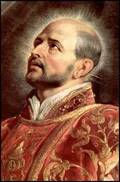
on Saint Ignatius of Loyola
"Ignatius gave us ways of prayer that deepen our union with Christ and our commitment, the call of Christ and our response. And he gave us also the idea that we needn't be afraid of the world around us, we should engage in the culture, take part in the great events of our time, be a part of the life because God is active in the world, just as He is active in our lives. And so we discern our way, to decide the best way of serving the Gospel in the world, and this begins from a vision of finding God in all things. God is present and active in His creation."
Feast Day - 31 July
on Saint James the Apostle & Santiago de Compostela
"After Christ sent his apostles to the end of the world, St James came to the end of the world which was thought in those times to be in North Western coast of Spain. The city of Santiago where his tomb now is is one of the main sanctuaries of Christianity, a place of pilgrimage .. Pope John Paul said that Santiago and the Camino was a prominent part in the construction of Europe .. To say Santiago is the same as to say to become a pilgrim, to pilgrimage .. Life is a pilgrimage, a pilgrim has to travel with a very light backpack .. somebody who goes through, who is weak, who goes through dangers .. All these symbols are symbols for life. We cannot carry many things in our life, we have to love God above every other thing. . A true pilgrim in life has to be poor, has only to put what is needed in his life which is the love of God our Saviour, a pilgrim should always be moving, in spiritual life we say that a pilgrim cannot stop growing, cannot say 'It is enough, I am not going to continue walking, I have loved enough, I do not need to grow in love' ..that is not going to the goal of our pilgrimage which is the greater Love."
Feast Day - 25 July
on Our Lady of Mount Carmel
by Father Matt Blake OCD ![]()
Ave Maria sung by Anna Johnstone
"When people meditated upon Mary they saw that Mount Carmel was such a fitting meditation. Mary is the one who reveals to the world the true God, Mary is the one who gives the world her Son. What Elijah did on Mount Carmel, showing the world who the true God is, is brought to completion in Mary; and the reins, the new life, the waters of baptism, all the symbols of that episode, become associated with Mary. So Our Lady of Mount Carmel is a devotion that has grown through the faith of people, through people's meditation upon Mary and what she means to them. It is through Mary that the world knows the true God, it is through Mary's son that we have been given new life through baptism, it is through Mary's son that the abundant generosity of God is so visible, so well seen."
Feast Day - 16 July
on Saint Bonaventure
"St Bonaventure had the enormous power of having both a spiritual approach to life, which was not something which was divorced from a clearly articulated way of dealing with the subject. It wasn't simply a question of having a funny inside feeling, it was something connected very closely with very clearly articulated ideas and structures, some of which he inherited from his ancestors in the spiritual life. There are 2 particular works of his which call for our attention - one is called The Threefold Way and the other is The Journey of the Mind into God. The Threefold Way outlines 3 basic stages through which the human spirit has to go if it wishes to arrive at the knowledge and love of God. And these 3 are: purgartio - freeing ourselves from sin, illuminatio - the knowledge of God which is the consequence of our purification, and perfectio - finally enjoying God, which takes place most perfectly in the life to come. ..This work has been called a masterpiece of the spiritual psychology - it's not simply a question of knowledge, or learning or understanding, or even of moral purity but it is a psychological introduction to the depth of the nature of God and that is something extremely important for us - the demand for the upward journey."
Feast Day - 15 July
on Saint Benedict
"When St Benedict fled to Subiaco many wanted to come and lead the life he was embarking on and they wanted him as their leader and so he wrote his rule. It's a wonderful document well known for its humanity and its simplicity of living, much of it going into considerable detail about how to pray what is called the Divine Office in Church, but preceded and followed by some wonderful spiritual advice to people who wanted to lead the monastic life. I suppose his most famous chapters are on obedience and humility. The other thing St Benedict stresses is stability within the community. So for a Benedictine, a monk takes 3 vows - obedience, stability and a third vow called 'conversatio morum' which is really conversion of life. For me, that's a wonderful vow because it gives one the whole of one's life to convert into a better way of life and that ties in so much with St Benedict's idea of a monk never despairing of the love and the mercy of God, and that continues right through one's life."
Feast Day - 11 July
on the Immaculate Heart of Mary
by Father Emmanuel Mansford CFR ![]()
Track - Learn Me Love by Fr Stan Fortuna CFR
"The wonderful thing about the heart of Mary is that it was a human heart and so she loved Jesus with this human heart. She loved him as we love people, she felt sad when he went away, she didn't always understand some of the things he said or did, but because she didn't have sin she trusted in the word that was revealed to her. So when we struggle to understand the work of Jesus in our life, the plan of God for us, we can say "Mary, lend me your heart that trusts so fully."
And so as we prepare to honour Our Lady in the purity of her heart, this heart that was so filled with joy because it didn't know sin (so often it's sin that robs us of the joy that God wants for us), let us ask her a simple prayer: "Mary, lend me your heart, so pure and clean, that I may love Jesus as you did, trust in Jesus like you did, follow Jesus as you did, even to the Cross, that I may be a witness to the resurrection. Amen."
Feast day - 2 July 2011 - the day after the Feast of the Sacred Heart of Jesus
on the Sacred Heart of Jesus
by Father Stan Fortuna CFR ![]()
Track - Loved by You by Fr Stan Fortuna CFR
"As we're closing the Year for Priests and celebrating the Sacred Heart of Jesus, there's a big connection there and not just for the ordained ministry but for the priesthood of the baptised. Because, as St Jean-Marie Vianney has said, and as Pope Benedict has made him the Patron Saint of Priests, "Love of the heart of Jesus is the priesthood." And I don't think he is just referring to us loving the heart, but the love of the heart of Jesus, the burning love that is in the heart of Jesus, is itself the priesthood. And when he was speaking last year about this, Pope Benedict said the first thing we need to learn from St John Vianney is the complete identification of the man with his ministry, and this ministry is nothing less than love. So on this great Solemnity of the Sacred Heart of Jesus it's really all about love. That's why St Margaret Mary Alacoque said "Set up your heart in this loving heart of Jesus. Place in this heart all your suffering and difficulties. He changes everything into love." That's the key - He changes everything into love."
Feast day - 1 July 2011 - Friday, week after Corpus Christi. This 3 2us reflection was recorded in 2010.
on Saints Peter and Paul
"St Peter is the person who stands, as it were, by his very name for stability, for endurance, for strength, whereas St Paul was always on the go, going all over the place, doing his best to teach the gospel of Christ to others, which he also supplemented by his wonderful letters, many of which still survive, arranged in order of length in the New Testament, from the longest - the Letter to the Romans, to the shortest - the Letter to Philemon. .. Both of them ended their lives as martyrs in Rome during the persecution of the Emperor Nero, which took place in 65 AD when he was able to accuse the Christians of the great fire in Rome."
Feast Day - 29 June
on Our Lady of Medjugorje, Queen of Peace
"Our Lady takes us to the Lord in the Blessed Sacrament, and she comes to us, inviting us to open our hearts to the Lord. Our Lady is the expression of the highest dignity which God has bestowed on men and that dignity which makes him a real child of God. St John says 'Now we are children of God. What we are going to be, we do not know, but we will see Him as He is.' So let's get rid of false glitters and idols, that our eyes become clear and that we can collaborate with Our Lady, to bring not only ourselves to conversion, fasting, prayer, to the Lord, but to take many with us; to be co-redeemers, to be collaborators in the redemptive work of God; that we too one day can say 'Our Lady, your visit was not in vain. You have stayed so long with us but thank you because you have convinced us, that through your humility, through your simplicity, through your tender love, you have convinced us that we can follow you, that we can open our hearts to you and that you can lead us into the open heart of your son."
1st apparition of Our Lady in Medjugorje was on 24 June 1981, the Feast of the Birth of John the Baptist; she first spoke to the 6 children the next day, telling them she was the Queen of Peace.
on the Birth of Saint John the Baptist
"Mother Teresa of Calcutta always said that it was interesting that it is an unborn child who announces Jesus' presence in the womb of Our Lady. The unborn child is the first to recognise Christ and I believe that for our times this is a strong message to respect the life of unborn children. .. She also said the biggest power in the world is the power of tenderness, and although John was such an outspoken, strong person, he was still the herald and the messenger of the one who brought us God's tenderness.. I believe this is the message of St John: the tenderness of God with the clarity and the strength of the truth."
Feast day - 24 June
on Corpus Christi (the Body & Blood of Christ)
by Father Anthony Doe ![]()
Track - Holy Eucharist by Zealous (feat. Fr. Stan Fortuna CFR)
"And in this union with Jesus and the Father, something amazing begins to take place in our humanity: our flesh and our spirit find a new relationship; we discover a new capacity to love selflessly like Jesus has loved us, loving each other with a new quality of self-gift, we're able to give ourselves in total freedom for the good of others, we are able to open our hearts out to the wonder of the world around us, but in such a way that we are constantly aware of God's loving presence within us. And this is really what the meaning of the Eucharist is - being brought alive first of all by the intimate love that Jesus has for our humanity, uniting himself to us in our woundedness but also our great capacity to be free and to love like He loves. And then, through the presence of Jesus within us, mysteriously He opens our spirit up to the love of the Father."
Feast day - Thursday after Trinity Sunday. Some countries have transferred to following Sunday
on the Trinity
by Monsignor Leo Maasburg ![]()
Music - Glory Be, sung by the Poor Clare Sisters TMD
"Our heart is built according to the Trinity, our love is built according to the Trinitarian love. All nature has a trinitarian character, one could say a genetic character of the Trinity, a fingerprint of the Trinity - from the nuclear structure to heaven and earth, from man and woman to all the laws of the universe. We can ask the Lord to make us see his presence in creation, in nature, in our human society, in the light of this mystery of the most Holy Trinity. And we can pray for those who haven't got the grace, the revelation which Jesus brought us of the secret of the inner trinitarian life.
It's so sad if people cannot see the core, the heart, the beauty of what God is doing with us. Because if we recognise it, if we see it, it may change the way we look at things, it may change our concrete action in day to day life, from the way we approach other people, whether we take it seriously what Jesus says 'Where 2 or 3 are gathered in my name, I am amongst them' - another fingerprint of the Trinity."
on the Visitation
by Father Matt Blake OCD ![]()
Magnificat sung by the Poor Clare Sisters TMD
"Jesus has just been conceived in the womb of Mary; it's probably only days, weeks at the very most, time when most women would not even know that they are pregnant, Jesus is a living human being but in the most hidden place any human being can be. Yet we remember that Jesus is hidden within us, within every person, in what St John of the Cross calls our deepest centre. That's where we first meet Him in the Gospels and that's where He is with us always. John the Baptist is also a child in the womb. We're told by his mother Elizabeth that he leapt with joy. John, in the womb, could receive Jesus, could receive the grace of Jesus's presence. A reminder to us that not only is a child in the womb a living human being, but a child in the womb has the capacity to receive God's grace, has a spiritual life, is in relationship with God."
Feast Day - 31 May. 2nd Joyful Mystery of the Rosary.
on the Immaculate Conception of Mary
by Monsignor Leo Maasburg ![]()
Ave Maria sung by the London Oratory School Schola
"The Immaculate Conception of Mary in the womb of her mother Anna - it starts us off to think: Why is that something so exceptional? Why do we celebrate it in a special feast day? I believe it is because we rejoice in the Lord for the unique holiness He has given to Our Lady. Her unique holiness was not a special gift for her, she was not just a privileged woman whom the Lord has chosen, but He has chosen the whole of humankind in her, she is only you could say the point where He entered that human history. She is the entrance door and also at the same time the symbol and the aim, the fulfilment and the example for that unique holiness to which all humankind is called. God has somehow promised in that vocation which He gave to Our Lady that He will lead the whole of humankind to that holiness. Our Lady in Lourdes calls herself "I am the Immaculate Conception". We know that in baptism, which is symbolised by the waters in Lourdes, we are called to follow her into that holiness, into that complete cleanliness in front of God; and humankind will not find its peace unless it is clean, unless it is holy whole.'
Feast Day - 8 December
on Blessed John Henry Newman
"When the Catholic Church canonises somebody they're talking about heroic virtue, heroic sanctity, that a person was heroic, they're not talking about somebody being faultless. I think sometimes people used to say 'O well, Newman had this fault and that fault, so he couldn't be a saint.' That's actually not relevant because no-one is perfect and indeed all the saints have faults. What the Church is looking for is a heroic quality, it's not looking for impeccability, it's looking for heroism and Newman heroically followed the kindly light of truth through his life."
Feast Day - 9 October
on Our Lady of the Rosary
"We pray the rosary because we want to unite in prayer so that the Holy Spirit can come upon us, overshadow us and bear fruit, the fruit of love, the fruit of the Kingdom of God."
Feast Day - 7 October
on Saint Gregory the Great
"In 590 St Gregory became Pope; he was Pope for 13 years and what a lot he did. He was only Pope for two years before he had to make treaties with the invading Lombards. He reformed the administration of Church lands, managed to devote an awful lot to charity, he kept the Church free from civil power. He had to deal with barbarian Franks and Visigoths, as well as the Lombards. A busy man, a very able man and, of course, he did something about the Anglo-Saxons. In the slave market in Rome he saw these three handsome young men and he said 'Where do they come from?' and they told him 'They're Angli' and he said 'Non Angli sed angeli' - 'Not Angles but angels.' And he realised that here was a country that needed evangelizing and so in 597 he sent St Augustine to evangelise the Anglo-Saxons."
Feast Day - 3 September
on Saint Dominic Guzmán
"Dominic was a very lovable, a very compassionate man and of course he loved God, and that, as with every saint, was the main thing about him. The order that he founded, the Dominicans, the Order of Preachers, has as its main note love of truth and approaching God through the intellect. And the greatest theologian of the Church, St Thomas Aquinas, was a Dominican. So a man very compassionate, very far-seeing, moved with love of sinners, eager for the truth, ready to spend himself for the Word of God. Very good with women ... But of all the things we might remember him for, perhaps the main thing is the rosary. St Dominic it is who is associated with it above all, the great saint of the rosary. And if we want to please him in heaven, we've only got to say the rosary."
Founder of the Order of Preachers (Dominicans). Feast Day - 8 August
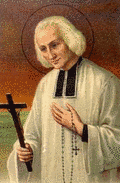
on Saint John Vianney, the Curé d'Ars
"For St John Vianney, prayer - lifting up our mind and heart to God each day - enables us to find our true home, where we really belong, deep in the heart of Jesus. John Vianney writes 'In prayer, which is union with God, the soul and God are like two pieces of wax molded into one.' What a wonderful image for us to pray with. One of the most famous stories about the Curé d'Ars is about someone who came to him as he sat at the back of the Church before the Blessed Sacrament, Our Lord fully present among us, and when this person asked "What are you doing all day with this?" he answered, "Nothing. I just look at Him and He looks at me." John Vianney knew the beauty of true friendship - just to be with the beloved was all he asked. This enabled him to see everything in a different light and so he writes for us 'In prayer well made, troubles vanish like snow in the rays of the sun.'
Feast Day - 4 August
on Saints Thomas More and John Fisher
"The two martyrs who really stand at the head of our English martyrs are Thomas More and Bishop John Fisher. .. They were in no sense narrow-minded men; they were part of what was really called a humanistic revival of the Renaissance, they were very open to new ideas, which made it so tragic that they had to give their lives for a new ideas which they couldn't accept, that is the supremacy of the king over the Church of England and the complete alteration of the Catholic faith. Blessed Newman, who was beatified last year by Pope Benedict, spoke eloquently about the way Catholic teaching and life develops over the years, but he stressed that while it is continually growing it doesn't mutate from one thing to another, so the whole art of discernment is seeing if this new development that is taking place, is this enriching our Catholic faith?"
Feast day - 22 June
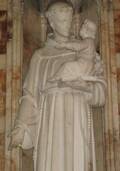
on Saint Anthony of Padua
"So marvellous was St Anthony's preaching that the churches in Northern Italy weren't large enough to contain the crowds that wanted to hear him preach. He did preach remarkably and this fact is recorded. Not only did he write out many of his sermons, which are still preserved, but the animals also wanted to hear him preaching and apparently even the fish poked up their heads out of the water to hear him.. One of the extraordinary things about him is that the rest of his body corrupted very quickly except for one particular part, the tongue. The fact the tongue alone remains now reflects something of his power as a speaker, that he was able to attract so many people and perhaps even the animal world to hear him, and that brings home to us the importance of preaching, of bringing home to other people the message of the Gospel."
Feast day - 13 June
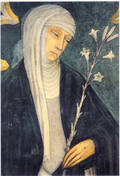
on Saint Catherine of Siena
by Father Francis Selman ♦
"What can we learn from this brief outline of St Catherine's life? First, she knew how to find all the time and space she needed for prayer in the busy household of her family. Second, prayer was not so much something that Catherine went to, as we do in moments snatched from our work, but she went from to her activity. Third, she knew how to combine inner peace with political activity.. 4th, the Eucharist was the centre of her daily life. And lastly, her life was focused on the Trinity, the source of all love, and on Christ who, by his Incarnation, is the bridge by which we cross over from earth to heaven."
Feast day - 29 April
on Saint Louis Marie Grignion de Montfort
"What St Louis is most known for is this marvellous teaching on the way we can consecrate ourselves to Our Lady. He called this in one of his books the 'secret of Mary'. It's a very instructive title .. it's just something that not many people know and, he says, if we all knew it, our lives would be much more truly what they're meant to be as Christians and it is simply in handing everything over to Jesus through the hands of Mary. His understanding is that Mary, being immaculate, has no trace of that hidden selfishness that so easily effects all our actions."
Feast Day - 28 April
on the Annunciation
by Father John Edwards SJ ![]()
Ave Maria sung by Anna Johnstone
"We should be so grateful that we have a mother like Mary. A mother is one who gives life. The life of Christ, which is meant to be in each one of us, comes as a condition through Mary. As St Augustine said: "From one woman, death (meaning Eve), from a woman, life (meaning Mary). On 25th March we should, among other things, be very grateful to our mother."
Feast of the Annunciation - 25 March (9 months before the Nativity)
on Saints Peter and Paul
"The lives of both saints, Peter and Paul, show that there is nothing which is beyond Christ's redeeming love, for Peter had betrayed Jesus and Paul had persecuted Christians. In their weakness Saint Peter and Saint Paul saw Christ as their strength."
Feast Day - 29 June
on Pentecost
"Catholic means universal. On that first day of Pentecost, the disciples went out and preached to people from all different nations, and they heard the message in their own language. You see, the Spirit unites the faithful at the deepest level whilst respecting their own characteristics and integrity."
Feast Day - 9 days after the Ascension. 3rd Glorious Mystery of the Rosary.
on the Ascension of Jesus
"The ascension of Christ means the passage of Christ into the dimension of eternal love. He paid the price for that, on the Cross, He loved to the end, even when they were crucifying Him, even when I was crucifying Him. So now He truly can live love to the end. In His sacred humanity He can enter into that dimension of being which is pure love, pure hospitality, pure welcome. He can fill the universe with His presence because there is nothing in the universe that He has not loved and redeemed. So when I celebrate the ascension, which at first sight can seem like the departure of Christ, I am celebrating the nearness of Christ, the welcome of Christ; that my loneliness, there's an answer to that; that there's a place in His heart which only I can fill, and that he means me to fulfill. Also there's a mission in this, that the hospitable Christ sends us to be hospitable, to be that place of welcome."
Feast day - Thursday, 40 days after Easter Sunday. A few (dull) countries have transferred this solemnity to the following Sunday. 2nd Glorious Mystery of the Rosary.
on Easter Sunday
"This risen Christ is a leader. He's not risen off to some distant place where we can only look at him from afar but he's now an energetic, revitalised leader and he leads us primarily to his Father but asking us, in the power of the Holy Spirit, to make that pathway clear through the time in which we live. So we are, on this day, called to begin to share in his mission. That's what Eastertide is about - we are to understand our call to share in the mission of the risen Christ and the gift we're given to do that is the gift of the Holy Spirit.. Suddenly the parameters of our vision have been blown open and we no longer look on life as just a series of separate todays but we look on it in the perspective of eternity and we know our destiny: He is risen, the first fruits of a new creation, of which we will most certainly share and when we see that, then we know where our true hope lies. And so we sing today "Alleluia, the Lord is risen." Let us give Him the praise and the glory and be part of His saving work today."
on the Easter Vigil
"So what we try to do on an Easter Vigil is understand how this light of Christ is calling me, through the ups and downs of my own story, through its twists and turns, maybe my own flight into Egypt, my own imprisonment and slavery, and now this exodus, this coming out, so that we can return to the light of Christ. Because in its light, we can see that He has never left us; we might have left him, but He has never left us."
on Holy Saturday
"Christ descends into hell and the great icons of this moment show us the figure of Christ carrying the banner of his victory, raising Adam from the prison of hell, from the prison of separation from God; and with Adam we trust all those who might be there. What it tells us is that there is nothing beyond the reach of this Saviour. No matter how desperate we might feel about ourselves, no matter how dark we might think our sin is, He is capable of reaching us, and of healing us, and of raising us."
on Good Friday
"Today, Good Friday. Funny isn't it that we call the day good on which Our Lord is put to death but it is profoundly the best of days because it is the day in which our freedom is won."
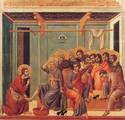
on Maundy Thursday
"Today we recall the Last Supper of the Lord with his disciples and there are two things that are prominent, but they're very connected. One is the washing of the disciples' feet and the second is the giving of Himself in the bread and wine of their supper which, in our Mass, becomes His Body and Blood."
on Saint Joseph
"All importance in life comes from making God big and important and that was what St Joseph was all about. Being humble before God, making way for God so that we find in everything that we really look for in life comes about wonderfully, if God is central to the whole thing."
Feast day - 19 March
on the Transfiguration and Lent
"Through the death and resurrection of Jesus we, in being called to and by turning to the brightness of the risen Lord, grow from glory to glory as we are transformed into the image we reflect. The transfiguration, witnessed by Peter, James and John, in fact even prefigures their own transfiguration into all that Christ calls them to be. It prefigures our own transfiguration into all that Christ calls us to be. Sharing His divine life we can be ready, especially in Lent, to bear even something of His Cross in our daily lives, mindful that as we contemplate the transfigured Christ we see not only His glory but the promise of our own."
on Our Lady of Lourdes
by Father Alexander Sherbrooke ![]()
"What happened in Lourdes, as then as today, Our Lady came to those who were suffering greatly because of poverty, illness, brokenness in their lives. Our Lady comes to teach us and to lead us to her Son Jesus. She wants to show us the way to understand that we are loved unconditionally by God."
Feast Day - 11 February, which is also the World Day of the Sick.
on the Presentation of Jesus in the Temple
"As Christians we are asked to take the light of the world around with us so that we can spread God's Word and the Gospel, because each of us is a temple of the Holy Spirit and therefore the light of the world."
Feast Day - 2 February
on the Triumph of the Cross
"If we let ourselves be drawn to Jesus, His Cross even now is lifted up within us."
Feast Day - 14 September
